Art & Artefacts
Contemporary Wooden Sculptures
Sculpted by artist Timothy Mhingiro from the Gutu district of Zimbabwe, these pieces are representative of traditional Shona style. Some pieces such as "Mother Nature" and "Mother and Child" (pictured) stand well over 180cm in height. Smaller pieces are also available.
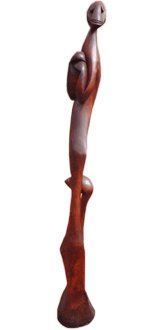
Timothy Mhingiro "Mother and Child"
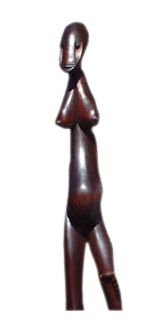
Timothy Mhingiro "Mother Nature"
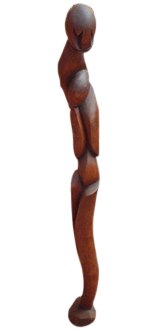
Timothy Mhingiro
Framed Prints
We have a small selection of framed prints. These brilliantly coloured depictions of Senegalese women capture the laconic grace of the African people.
Also coming in soon are "Haircut Boards". This home spun commercial art will add the flavour of today's Africa to your home.
Masks and Shields
Our range of masks and ceremonial shields are drawn from a wide range of cultural groups in West, Central, and East Africa. We have a high demand for these items so our range is constantly changing. Most masks and shields come mounted on a simple wooden stand and are accompanied by a small note explaining the item's cultural origins and significance.
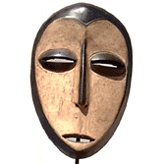
Lega Mask
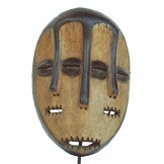
Yaure Mask
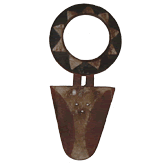
Bedu Mask
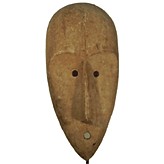
Fang Mask
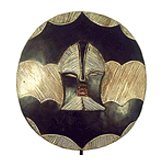
Kifwebe Shield
Lega Mask: This mask originates from the Lega Tribe in the Congo. They are used during initiation ceremonies. The masks are emblems of rank as well as links between the dead (former initiates) and the living (new initiates).
Yaure Mask: This mask originates from the Ivory Coast and symbolises the "Yu" or spirit power. It is used predominantly in dancing ceremonies where the celebration purifies the village after a death, and helps the soul of the deceased on to its final resting place.
Bedu Mask: Originating from the Nefana people of the Ivory Coast, this highly stylized mask represents either a buffalo or antelope, the round section at the top being the horns. The Nefana are pastoralists and cattle play a very significant role in their ceremonial life.
Fang Mask: Originating from Fang in Gabon, this mask was worn by members of the male society during initiation of new members, and persecution of wrong doers. Masqueraders clad in raffia costumes and attended by helpers would materialize in the village after dark, illuminated by flickering torch light. The mask was intended to invoke the spirit of the ancestors, and embody the spirits of the deceased.
Kifwebe Shield: This is a ceremonial shield used by the Kifwebe, a cult of witch doctors, from the Congo. The white markings on the shield are typical of the Kifwebe style and are also seen on masks and in body scarification.
Ethiopian Crosses
Christianity has existed in Ethiopia for over 1,600 years. The Coptic Cross is used in religious processions, carried by hand or on a staff. Small crosses may also be worn as jewellery. The crosses are individually hand crafted and are usually made from a silver alloy although some are carved from wood. Crosses range in height up to 70 - 80cm.
Our small hand held crosses are mounted on a stand. Large crosses are usually free standing. Dimensions given are for the cross only, excluding the stand.
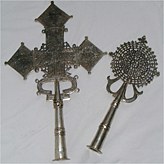
Ethiopian Crosses
Traditional Figure Sculpture
In traditional African society carved wooden statues were used to harness the efforts of both the living and the dead for the benefit of the community. Kept in huts and household shrines spirits of ancestors and other entities were encouraged by ritual to continue to play a part in daily life. In addition to the role of guardian, ancestors were also seen as the repositories of knowledge and experience that should not be wasted.
The various rituals and forms of these sculptures varies from across tribal groups, but generally speaking they are known as ancestor figures when they are set up to receive the spirits of the departed, or cult figures when they are connected with the activities of definite cults or societies.
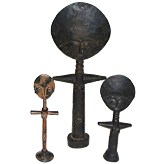
Ashanti fertility dolls
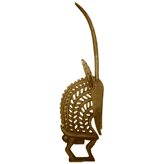
Chi'wara
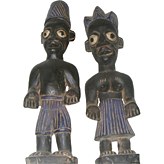
Yoruba Ancestor Pair
Akua'ba (Fertility doll): carried by young Ashanti women (Ghana)
Chi'wara: Bambara (Nigeria) This headgear is worn during planting and harvest ceremonies in honour of the antelope god who taught the Chi'wara to hoe the land.
Ancestor Pair: Ghana

